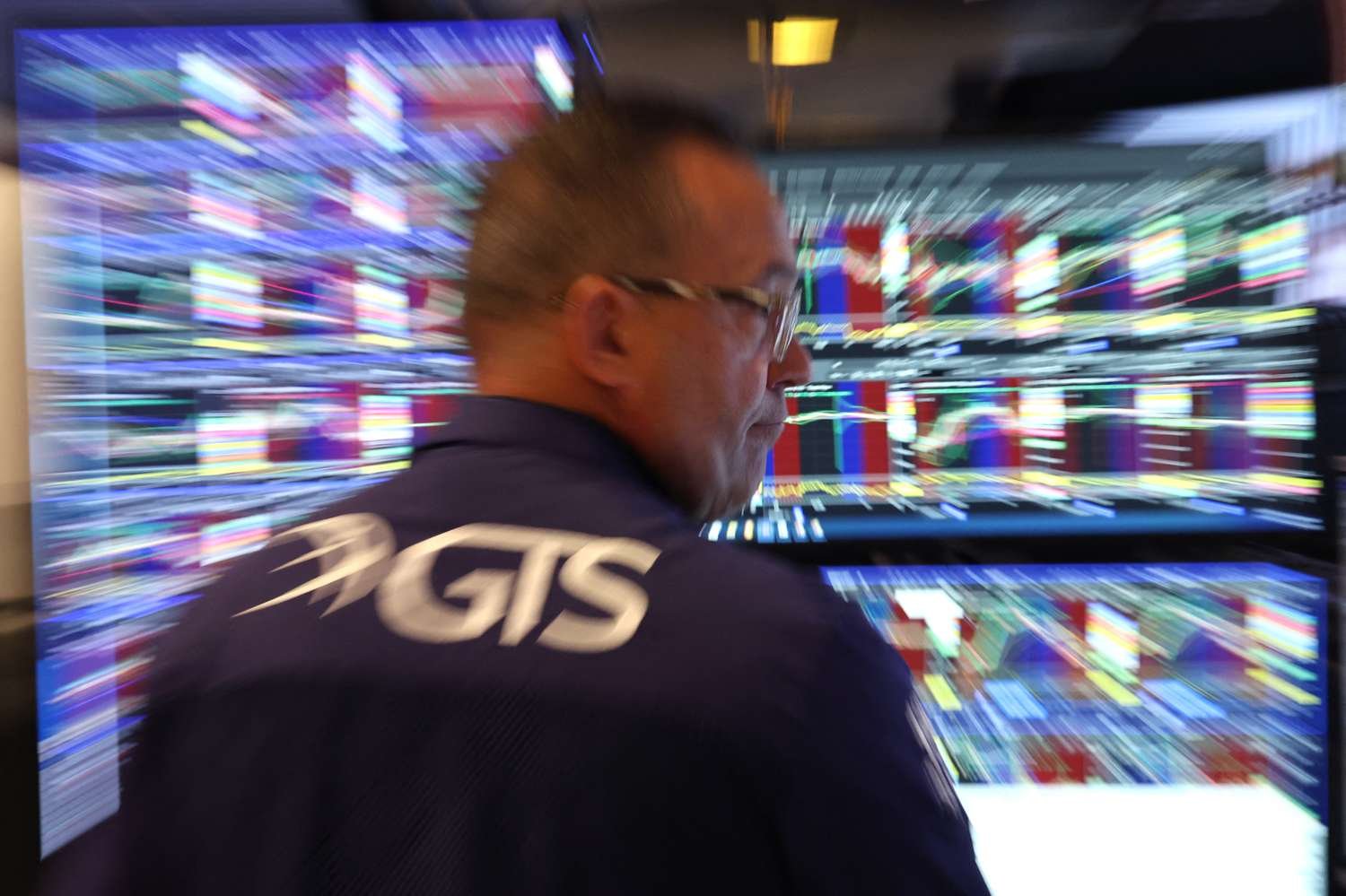AI Insights
The AI Trade Picks Up Steam After Oracle’s ‘Truly Historic’ Quarter

Key Takeaways
- Cloud computing and software provider Oracle on Tuesday reported its backlog grew to $455 billion last quarter, a 359% increase from the prior year.
- The company’s pipeline signaled artificial intelligence spending should remain strong for several years, sending Oracle shares sharply higher and boosting the majority of AI stocks.
- Wall Street analysts expressed shock on Oracle’s earnings call Tuesday, with one calling the company’s growth forecasts “truly historic.”
The artificial intelligence trade got a shot of adrenaline on Wednesday after results from database software and cloud provider Oracle suggested the AI spending bonanza has ample room to run.
Oracle (ORCL) on Tuesday reported its backlog swelled to $455 billion, a 359% year-over-year increase, after it signed four multibillion-dollar cloud deals in the first quarter of its 2026 fiscal year. Executives said the backlog is expected to surpass half a trillion as Oracle inks more big deals in the coming months.
Oracle also forecast cloud revenue would grow from an estimated $18 billion this fiscal year to $144 billion in 2030, about $50 billion more than Wall Street had forecast. Oracle said most of that revenue forecast was already reflected in its backlog, giving some investors greater confidence in the numbers. Meanwhile, the Wall Street Journal reported Wednesday that Oracle had signed a five-year contract worth $300 billion with ChatGPT creator OpenAI.
Oracle’s projections completely overshadowed lackluster first-quarter results, and sent its shares soaring as much as 43% on Wednesday.
The rising tide of robust AI spending was lifting plenty of boats on Wednesday. Shares of AI chip giants Nvidia (NVDA) and Broadcom (AVGO) were recently up more than 4% and 9%, respectively, while chip design company Arm Holdings (ARM) surged more than 8%. The PHLX Semiconductor Index (SOX) was up about 2%. Data center infrastructure provider Vertiv Holdings (VRT) jumped about 9%, while power generators Vistra (VST) and Constellation Energy (CEG) advanced 8% and 6%, respectively.
Oracle’s major cloud competitors were the only drag on the AI trade on Wednesday. Amazon (AMZN) declined more than 3%, while Meta Platforms (META) dropped nearly 2%. Alphabet (GOOG) and Microsoft (MSFT) ticked higher.
Wall Street Hails ‘Momentous’ Quarter
Wall Street’s ebullience over the results was first visible on Oracle’s earnings call Tuesday night.
“Even I’m sort of blown away by what this looks like going forward,” said Guggenheim analyst John DiFucci at the top of the question and answer portion of the call. “I tell my team, ‘Pay attention to this’—even those that are not working on Oracle—‘because this is a career event happening right now,” DiFucci added.
“There’s no better evidence of a seismic shift happening in computing than these results that you just put up,” said Deutsche Bank analyst Brad Zelnick. Others called the quarter “momentous” and the backlog growth “truly historic.”
AI Demand, Investments Expected To Remain Strong
AI investments have been driven by what many have characterized as insatiable demand for training and inference, and Oracle’s results appeared to support that assessment.
On Oracle’s earnings call, co-founder and chair Larry Ellison said an unnamed company had requested all of Oracle’s available inferencing capacity. “I’d never gotten a call like that,” Ellison said.
Big Tech’s investment in capacity to meet that demand is expected to remain robust in the coming years, supported by healthy cash flows at the biggest cloud providers and supportive tax incentives.
Cloud providers like Microsoft, Alphabet and Amazon have been key drivers of the AI infrastructure trade in recent years. Hyperscalers are expected to spend a cumulative $368 billion on infrastructure this year, with much of that earmarked for data centers and the chips and servers that fill them, according to Goldman Sachs.
Oracle on Tuesday forecast capital expenditures of $35 billion in the 12 months through May 2026, about $10 billion more than the figure executives gave as a minimum last quarter.
Tax incentives written into the recently passed One Big Beautiful Bill Act should also support AI infrastructure investment. Morgan Stanley expects the bill’s immediate capital investment depreciation provisions to boost Big Tech’s free cash flows by nearly $50 billion this year. The firm expects a sizable portion of those tax savings to be spent on AI infrastructure.
AI Insights
Goldman Sachs Warns An AI Slowdown Can Tank The Stock Market By 20%

Artificial intelligence has propelled the stock market to all-time highs, but Goldman Sachs (NYSE:GS) recently warned that once AI spending slows down, the stock market can tank by 20%. A research note from Goldman Sachs Analyst Ryan Hammond cited the danger of hyperscalers inevitably cutting back on AI expenditures, according to Fortune.
“A reversion of long-term growth estimates back to early 2023 levels would imply 15% to 20% downside to the current valuation multiple of the S&P 500,” Hammond reportedly wrote in his research note.
Don’t Miss:
Right now, AI spending is full steam ahead, but Hammond wrote that a few analysts are assuming that a sharp deceleration will take place in Q4 2025 and 2026.
Tech giants haven’t gotten the memo. Meta Platforms (NASDAQ:META) said this week it will spend $600 billion on AI over the next three years. Zuckerberg later posted on Threads that it’s possible the company will invest more than $600 billion during those three years. He even said a “significantly higher number” was likely through the end of the decade.
Microsoft (NASDAQ:MSFT) made another big AI deal this week by securing a five-year, $17.4 billion AI infrastructure deal with Nebius (NASDAQ:NBIS). This type of rapid spending indicates AI growth can continue beyond the current rally.
Trending: ‘Scrolling To UBI’ — Deloitte’s #1 fastest-growing software company allows users to earn money on their phones. You can invest today for just $0.30/share.
Artificial intelligence plays a critical role in the stock market’s performance based on the top companies in major benchmarks like the S&P 500 and Nasdaq. Data from Slickchart shows that top AI beneficiary Nvidia (NASDAQ:NVDA) makes up approximately 7% of the S&P 500.
The top eight publicly traded corporations on the S&P 500 are all heavily invested in artificial intelligence. They are ramping up their AI spending and aim to release products and services that use AI. These eight companies make up more than 36% of the S&P 500.
There are also corporate giants outside of the S&P 500’s top 10 that still invest heavily in artificial intelligence. Oracle (NYSE:ORCL), Palantir (NASDAQ:PLTR), and Cisco (NASDAQ:CSCO) are some of the most notable S&P 500 members in the category.
AI Insights
A Sample Grant Proposal on “Artificial Intelligence for Rural Healthcare” – fundsforNGOs
AI Insights
Robinhood CEO says just like every company became a tech company, every company will become an AI company

Earlier advances in software, cloud, and mobile capabilities forced nearly every business—from retail giants to steel manufacturers—to invest in digital transformation or risk obsolescence. Now, it’s AI’s turn.
Companies are pumping billions of dollars into AI investments to keep pace with a rapidly changing technology that’s transforming the way business is done.
Robinhood CEO Vlad Tenev told David Rubenstein this week on Bloomberg Wealth that the race to implement AI in business is a “huge platform shift” comparable to the mobile and cloud transformations in the mid-2000s, but “perhaps bigger.”
“In the same way that every company became a technology company, I think that every company will become an AI company,” he explained. “But that will happen at an even more accelerated rate.”
Tenev, who co-founded the brokerage platform in 2013, pointed out that traders are not just trading to make money, but also because they love it and are “extremely passionate about it.”
“I think there will always be a human element to it,” he added. “I don’t think there’s going to be a future where AI just does all of your thinking, all of your financial planning, all the strategizing for you. It’ll be a helpful assistant to a trader and also to your broader financial life. But I think the humans will ultimately be calling the shots.”
Yet, Tenev anticipates AI will change jobs and advised people to become “AI native” quickly to avoid being left behind during an August episode of the Iced Coffee Hour podcast. He added AI will be able to scale businesses far faster than previous tech booms did.
“My prediction over the long run is you’ll have more single-person companies,” Tenev said on the podcast. “One individual will be able to use AI as a huge accelerant to starting a business.”
Global businesses are banking on artificial intelligence technologies to move rapidly from the experimental stage to daily operations, though a recent MIT survey found that 95% of pilot programs failed to deliver.
U.S. tech giants are racing ahead, with the so-called hyperscalers planning to spend $400 billion on capital expenditures in the coming year, and most of that is going to AI.
Studies show AI has already permeated a majority of businesses. A recent McKinsey survey found 78% of organizations use AI in at least one business function, up from 72% in early 2024 and 55% in early 2023. Now, companies are looking to continually update cutting-edge technology.
In the finance world, JPMorgan Chase’s Jamie Dimon believes AI will “augment virtually every job,” and described its impact as “extraordinary and possibly as transformational as some of the major technological inventions of the past several hundred years: think the printing press, the steam engine, electricity, computing, and the Internet.”
-

 Business2 weeks ago
Business2 weeks agoThe Guardian view on Trump and the Fed: independence is no substitute for accountability | Editorial
-
Tools & Platforms1 month ago
Building Trust in Military AI Starts with Opening the Black Box – War on the Rocks
-

 Ethics & Policy2 months ago
Ethics & Policy2 months agoSDAIA Supports Saudi Arabia’s Leadership in Shaping Global AI Ethics, Policy, and Research – وكالة الأنباء السعودية
-

 Events & Conferences4 months ago
Events & Conferences4 months agoJourney to 1000 models: Scaling Instagram’s recommendation system
-

 Jobs & Careers2 months ago
Jobs & Careers2 months agoMumbai-based Perplexity Alternative Has 60k+ Users Without Funding
-

 Podcasts & Talks2 months ago
Podcasts & Talks2 months agoHappy 4th of July! 🎆 Made with Veo 3 in Gemini
-

 Education2 months ago
Education2 months agoVEX Robotics launches AI-powered classroom robotics system
-

 Education2 months ago
Education2 months agoMacron says UK and France have duty to tackle illegal migration ‘with humanity, solidarity and firmness’ – UK politics live | Politics
-

 Podcasts & Talks2 months ago
Podcasts & Talks2 months agoOpenAI 🤝 @teamganassi
-

 Funding & Business3 months ago
Funding & Business3 months agoKayak and Expedia race to build AI travel agents that turn social posts into itineraries

